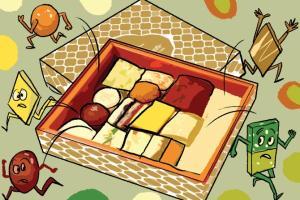To take from the poet Agha Shahid Ali, Mr Rauts history is in the way of the memory these two cities carry of each other

Illustration/Uday Mohite
![]() When I heard that one Mr Nandgaonkar of the Shiv Sena had launched an offensive against Karachi Sweets, I wondered if he, like me, had been disappointed by a box of assorted Diwali mithais.
When I heard that one Mr Nandgaonkar of the Shiv Sena had launched an offensive against Karachi Sweets, I wondered if he, like me, had been disappointed by a box of assorted Diwali mithais.
As a child, I always hated mono-mithai boxes on Diwali, awaiting the multiple delights of an assorted box, diminished however, by two cellophane-wrapped jelly jewels in the corner, as blah to the tongue as their stained glass red, yellow and green was tantalising to the eyes. Gluey, stretchy, sugary, they gave me the same cheated feeling as a long patriotic song (eg. Nanha munna rahi hoon) appearing in the last seven minutes of Chitrahar, dousing the excitements of the preceding mazedar songs.
Mr Nandgaonkar was not bitter about sweets however, but wanted 'Karachi' replaced by something Marathi as he hates Pakistan. Sanjay Raut tweeted the party did not endorse this as Karachi Sweets has been in Bombay for 60 years and has nothing to do with Pakistan. Well, that depends. Businesses named Karachi exist around the country—consider Hyderabad's famous Karachi Bakery—often owned by families who moved from Karachi to India post Partition. Similarly, a number of businesses in present-day Karachi, are called Bombay—Bombay Sweets, Bombay Dry Fruit, Bombay Light House. Some have historical links to Bombay. Some simply reflect the lingering memory of Bombay in Karachi.
Twins born by the seaside, built by trade and business, Karachi and Bombay have a long and intertwined history of comings and goings, and both bear the cultural inflection of business communities like Sindhis and Memons. Writing in Dawn, Akhtar Balouch describes an exhibition featuring goods from Britain and various South Asian countries held in Karachi in 1869. After the exhibition, some Bombay traders who had participated, set up camp in an empty ground near by and started selling their goods. Over time, this became a market, still known as Bombay Bazaar. When I visited Karachi several years ago, a man I met mentioned how some migrants to the city had built replicas of the homes they had left behind in Bombay, buildings whispering echoes across borders.
Love it or hate it, Karachi halwa embodies this entangled history. It's said to be invented by Punjabi Chandu Halwai Karachiwala, established Karachi, 1896, moved to Bombay, 1947. Some trace its origins (and of all halwas) to Turkey, home of the delicate Turkish Delight. Many people do love Karachi halwa but call it Bombay halwa, especially in the South, as also Bombay Karachi halwa, Ice Halwa and Rubber Halwa elsewhere. It (unfavourably) evokes comparison to Kerala's jackfruit halwa, on account of family resemblance. It is an object of history and memory, as we are all children of two people, creatures moving between two times, the past and the future; a symbol, that we belong to many places and times at once. To take from the poet Agha Shahid Ali, Mr Raut's history is in the way of the memory these two cities carry of each other.
Despite the Shiv Sena's new positioning as secular and modern thinking, aggression and antipathy to Muslims, emblematised by Pakistan, have been a significant ingredient of their political recipe. Times change, and so do recipes. Perhaps it's just that Mr Nandgaonkar's memory of this history got in the way, one hopes, briefly—or maybe it's always going to be in the box, like Karachi halwa.
Paromita Vohra is an award-winning Mumbai-based filmmaker, writer and curator working with fiction and non-fiction. Reach her at paromita.vohra@mid-day.com
Keep scrolling to read more news
Catch up on all the latest Mumbai news, crime news, current affairs, and a complete guide from food to things to do and events across Mumbai. Also download the new mid-day Android and iOS apps to get latest updates.
Mid-Day is now on Telegram. Click here to join our channel (@middayinfomedialtd) and stay updated with the latest news
 Subscribe today by clicking the link and stay updated with the latest news!" Click here!
Subscribe today by clicking the link and stay updated with the latest news!" Click here!









